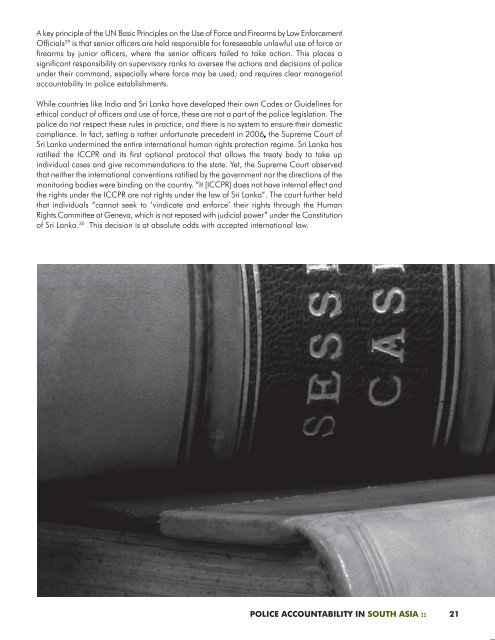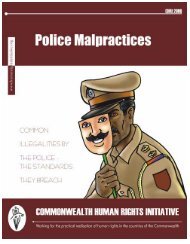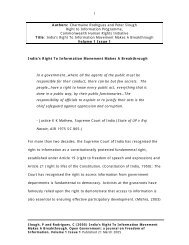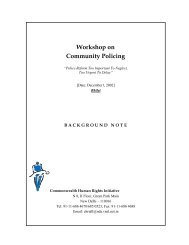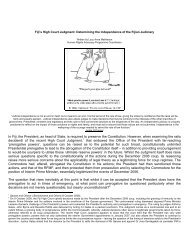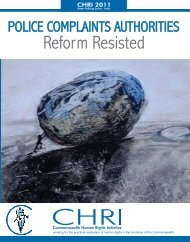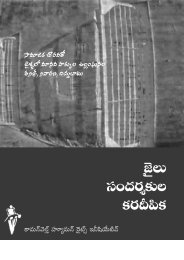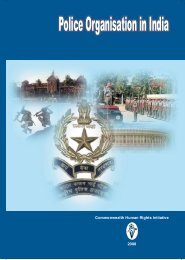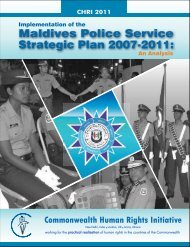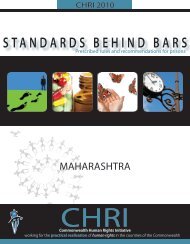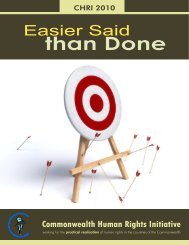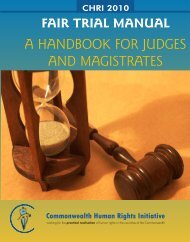FEUDAL FORCES: DEMOCRATIC NATIONSwhen treaties and covenants are signed and acceded to, or ratified by countries. 19 All thecountries <strong>in</strong> the region are members of the United <strong>Nations</strong>, but not all have ratified all theconventions relat<strong>in</strong>g to civil and political rights that are relevant <strong>in</strong> terms of polic<strong>in</strong>g. Of the fivecountries, Pakistan has not ratified or acceded to the International Covenant on Civil andPolitical Rights (ICCPR); neither India nor Pakistan have ratified or acceded to the ConventionAga<strong>in</strong>st Torture and Other Inhuman or Degrad<strong>in</strong>g Treatment or Punishment (CAT).By ratify<strong>in</strong>g a human rights treaty, a state is legally obliged to br<strong>in</strong>g domestic laws and policies<strong>in</strong> l<strong>in</strong>e with agreed standards. The state is also required to report periodically to the bodies thatmonitor progress towards compliance with treaty obligations. If effective, this report<strong>in</strong>g systemcan significantly reduce persistent human rights violations and ensure regular scrut<strong>in</strong>y of progresstowards true human rights protection. In practice, however, the treaty monitor<strong>in</strong>g bodies arehampered by regular delays <strong>in</strong> state report<strong>in</strong>g, state reluctance to share complete detailsabout human rights issues, and state unwill<strong>in</strong>gness to implement recommendations.Us<strong>in</strong>g <strong>in</strong>ternational <strong>in</strong>struments for local policeaccountabilityUnder the <strong>in</strong>ternational human rights regime, responsibility lies with the stateand it must account for violations by police officers of citizens’ human rights.When b<strong>in</strong>d<strong>in</strong>g <strong>in</strong>ternational standards are violated or ignored by the police,<strong>in</strong>dividuals and organisations can use <strong>in</strong>ternational mechanisms to <strong>in</strong>troduce orspeed up <strong>in</strong>-country processes for accountability and reform. While some of theUN treaty Committees 20 may accept <strong>in</strong>formation from civil society, others mayalso accept compla<strong>in</strong>ts from <strong>in</strong>dividuals whose rights have been violated. 21The Commission on Human Rights also asks experts to study particular humanrights issues, and has a system of ‘special procedures’ 22 . These procedures haveoccasionally brought police-specific violations of human rights – brutality, summaryexecutions and bias - to global attention. There are also procedures that <strong>in</strong>vokeCommission discussion on human rights issues and public debate on particularissues. Consequences of these processes can be ECOSOC 23 resolutions condemn<strong>in</strong>ga state for violations. These high-profile <strong>in</strong>ternational resolutions are <strong>in</strong>tended toshame the state <strong>in</strong>to correct<strong>in</strong>g the situation.In Sri Lanka, where police have been <strong>in</strong>volved with large-scale disappearances 24 andwhere “torture is frequently resorted to…by the police” , 25 five organisations submitted<strong>in</strong>formation on the systematic practice of torture to the UN Committee Aga<strong>in</strong>st Torture.As a consequence, a member of the Committee’s Work<strong>in</strong>g Group on Enforced orInvoluntary Disappearances visited the island <strong>in</strong> 1999 and the <strong>in</strong>tervention played asignificant role <strong>in</strong> the establishment of accountability mechanisms like the HumanRights Commission, the National <strong>Police</strong> Commission, the Disappearances InvestigationUnit and the Prosecution of Torture Perpetrators Unit.There are a number of police-specific UN resolutions 26 that are <strong>in</strong>tended to assist <strong>in</strong> treatyimplementation. Most notable of these is the UN Code of Conduct for Law EnforcementOfficials, which specifically requires that “In the performance of their duty, law enforcementofficials shall respect and protect human dignity and ma<strong>in</strong>ta<strong>in</strong> and uphold the human rightsof all persons.” 27 This Code of Conduct lays down three core features of acceptable polic<strong>in</strong>g:representative of the community, responsive to the community and accountable to thecommunity. 28 A representative police organisation requires that staff<strong>in</strong>g reflect the ethnicity,gender, language, caste and religious composition of the population it serves. Responsivenessdemands that the police serve the people and not just the government. Most vital is thepr<strong>in</strong>ciple of accountability, which runs through these codes and pr<strong>in</strong>ciples and is a keyfeature of democratic polic<strong>in</strong>g.20 :: POLICE ACCOUNTABILITY IN SOUTH ASIA
A key pr<strong>in</strong>ciple of the UN Basic Pr<strong>in</strong>ciples on the Use of Force and Firearms by Law EnforcementOfficials 29 is that senior officers are held responsible for foreseeable unlawful use of force orfirearms by junior officers, where the senior officers failed to take action. This places asignificant responsibility on supervisory ranks to oversee the actions and decisions of policeunder their command, especially where force may be used; and requires clear managerialaccountability <strong>in</strong> police establishments.While countries like India and Sri Lanka have developed their own Codes or Guidel<strong>in</strong>es forethical conduct of officers and use of force, these are not a part of the police legislation. Thepolice do not respect these rules <strong>in</strong> practice, and there is no system to ensure their domesticcompliance. In fact, sett<strong>in</strong>g a rather unfortunate precedent <strong>in</strong> 2006, the Supreme Court ofSri Lanka underm<strong>in</strong>ed the entire <strong>in</strong>ternational human rights protection regime. Sri Lanka hasratified the ICCPR and its first optional protocol that allows the treaty body to take up<strong>in</strong>dividual cases and give recommendations to the state. Yet, the Supreme Court observedthat neither the <strong>in</strong>ternational conventions ratified by the government nor the directions of themonitor<strong>in</strong>g bodies were b<strong>in</strong>d<strong>in</strong>g on the country. “It [ICCPR] does not have <strong>in</strong>ternal effect andthe rights under the ICCPR are not rights under the law of Sri Lanka”. The court further heldthat <strong>in</strong>dividuals “cannot seek to ‘v<strong>in</strong>dicate and enforce’ their rights through the HumanRights Committee at Geneva, which is not reposed with judicial power” under the Constitutionof Sri Lanka. 30 This decision is at absolute odds with accepted <strong>in</strong>ternational law.POLICE ACCOUNTABILITY IN SOUTH ASIA :: 21


